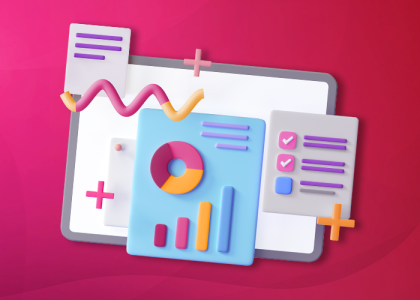Introduction
Data is one of your most precious resources. This guide from MHR will show you everything you need to know about what data management is and why it is important. We’ll cover some key types of data management tools and show the benefits of getting things right. You’ll also uncover how to effectively implement a data strategy, and what the costs might be for doing so.
What is data management?
Data management is an umbrella term that covers collecting, storing and using data in a way that is safe, secure and cost-effective, without compromising on efficiency. The general goal is to help an organisation keep all their data connected, visible and accessible, so it can be used to drive decisions.
Data management can include, but isn’t limited to:
- Keeping data secure
- Destroying data according to compliance requirements (such as GDPR)
- Store data across different devices, clouds and servers
- Use data in disaster recovery
- Update data across your apps
How does data management work?
There is no one size fits all approach to data management. How your policy will be enacted hugely depends on what your needs; one of the core tenants of data management is that it serve the needs of the organisation.
Whatever approach you take, your data management process should be standardised and factored into your onboarding. Make sure you offer regular training too, so that everyone is always following best practice.
Types of data management tools
The best way to figure out how to create a data management pool will depend on the tools you use. Here are some of the data management systems that you may want to consider.
Data governance
Data governance is a collection of rules that will ensure data is of good quality, compliant with any rules and secure from bad actors. This includes things like establishing who’s responsible for what data, and who manages your infrastructure.
Think of data governance as the people side of your data management.
Data integration
Data integration tools bring all the data you’ve collected together into one place. This can be done manually, but because of the sheer volume of data to handled it’s usually better to have a system. These tools will feature a user-friendly interface that will prepare your data for use across the organisation.
Business intelligence (BI)
BI tools typically take data from a data warehouse or data mart, then analyse and report on that data. These are essential if you want to make sense of large databases, as it would be nearly impossible for a human being to do the same job manually.
Data modelling
Data modelling involves visually representing your data in a way that be communicated to the rest of your organisation. Data models abstract your data in a way that more people can understand without needing to get to grips with the data itself.
Why is data management important?
Data is an incredibly valuable resource, and it’s used by just about every aspect of the modern workplace. Without good data management, however, you’ll never get the true value out of your data. Here are the four key areas that data management can help you with.
Visibility
To get the most use out of your data, the relevant people need to be able to find it quickly and easily. That will help them generate more confident and accurate analysis, creating a more productive and organised workplace.
Security
Data loss (particularly through thefts and security breaches) is one of the biggest concerns for modern organisations. They can cost a fortune in fines, repair work and goodwill. Without a good data management strategy, you’re much more likely to fall foul of a data breach.
Efficiency
When you have concrete processes in place, your organisation speeds up. Onboarding becomes easier, and everyone is working with the same set of assumptions, which improves accuracy and keeps everything working efficiently.
Cost-saving
Data management is quite scalable, making it incredibly cost effective in the long run. For example, you’ll reduce the duplication, which lowers unnecessary costs. Plus, when you’re making fewer errors, you’re wasting less time on fixing them.
What are the benefits of using data management systems?
There are a range of benefits that come from implementing a data management system. Most of them focus on improved efficiency, but their cybersecurity benefits can’t be overstated. Here are some of the more specific benefits of using a data management system.
Enable better decision-making
To make the most effective decisions, you need to be as informed as possible. If you choose something based on an assumption, it’s more likely you’ll be proven wrong. With good data management, it becomes a lot easier to generate unique insights.
Take advantage of new business opportunities
Similarly, jumping on new opportunities requires agility. If you have to wait for everything to be in place, the opening will often pass you by. Real-time data and a single source of truth will keep you agile while also making it even easier to spot and anticipate these moments.
Avoid data breaches
Data is a precious asset, and so there are a lot of criminals looking to get their hands on yours. Data breaches are incredibly costly, as you have to fix the issue, inform your customers and employees and potentially shell out for fines. Data management can help you protect yourself, as you’ll know where sensitive data is stored, how to encrypt is and which users should be able to access it.
Improve business processes
Data management ensures you’ll eradicate data redundancy, as all your systems will draw from one source. Likewise, sharing data between teams gets a lot easier, which in turns makes projects across teams a lot simpler.
How operational data is managed in the workplace
Operational data is a specific form of strategic data, all taken from the internal functions and processes of a business. This can include your labour statistics, supplier information and any information on direct competitors. Managing this will improve your operational efficiency. While finance data is typically used for more in-depth reporting, operational data is used more for day-to-day operations.
What is the cost of implementing a data management system?
It’s difficult to pin down an exact cost of implementing a data management system, because the price will vary so much depending on what your business needs and what features you choose from. Factors that could impact the price could include:
- Set up fees
- Audience segments, including look-alike audiences
- Contract length
- 1st party data usage
- Any 3rd party tools
How to create a data management plan
You can start putting together a cohesive data management strategy with these five simple steps.
- Identify your objectives
What are you trying to achieve with your data management plan? Compare the objectives of your organisation with the teams within it. What data do you need to make those happen?
- Create strong processes
Now you need to consider how you’re going to collect, use and distribute your data. This is where you’ll identify stakeholders for each step, and get in depth with what each stage looks like.
- Pick the right tech
Data management is nearly impossible to do manually, so picking the right technology platforms is vital. Using your processes and objectives, you can refine your search for the right technology
- Data governance
Data governance will help you ensure your data is secure and safe. It also establishes who’s responsibility certain parts of your data management plan is.
- Build a long term culture
Training and getting buy-in from data owners across the business is vital for sustaining your data management strategy.
Manage your data effectively with reliable tools from MHR
If you want to get started on creating an effective data management strategy, MHR can provide you with all the tools you need to thrive, with data management enmeshed in your culture.
Check out this guide for more details about how we can help.


































































